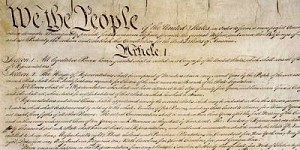There is much to laud about our founding document. The mechanics of our government have, largely, served us well over these two and a quarter centuries. Our founders were wise to construct a system that was at once powerful enough to govern, yet limited in what it could do.
In the Federalist, Madison wrote:
In framing a government which is to be administered by men over men, the great difficulty lies in this: you must first enable the government to control the governed; and in the next place oblige it to control itself.
This delicate balance is the genius of our federal system. In this way, the U.S. Constitution deserves to be celebrated.
While it may be bad form to quibble on such a day, akin to arguing with someone while they are blowing out their birthday cake candles, permit me a moment of poor taste–or two.
One, I am happy to celebrate the Constitution. I would prefer, however, that those same schools who today toss plaudits at the text would actually teach it with great and unyielding vigor. To paraphrase Abraham Lincoln, the Constitution should be the source of our political religion, the thing we turn to as we determine what government should or should not do. In the end, it is the people who are the parchment’s best and most feared enforcers. Politicians who turn up their noses at the sound of a gavel quake in their loafers and heels when the ballot box shows teeth. Using the Constitution to hold our elected officials accountable requires that we, the people, actually know something about it.
Two, at the risk of being that guy, I have to at least raise an uncomfortable technicality. Back in 2004, then U.S. Sen. Robert Byrd (D-WV) snuck a rider into an appropriations bill. This was not unusual behavior for Sen. Byrd, who excelled at securing pet projects for his home state. The rider, which eventually became a law, mandated that educational institutions receiving federal funds celebrate the U.S. Constitution on Sept. 17, the anniversary of the Constitutional Convention’s endorsement of the document.
The rub, of course, is that a federal law that mandates such a thing may, in fact, be itself unconstitutional. If, as quaint as it sounds, Congress should be limited to the powers provided it in Article 1, Section 8, or even limited to powers necessarily and properly related to those enumerated powers, it is difficult to figure out a way for the federal government to require local schools to celebrate such a day. Yes, the government might stipulate that schools may opt out and lose funding, but that is simply the government using the carrot of funds to accomplish what it cannot achieve through law. In the end, this is a distinction without a meaningful difference, especially in the outcome. This is really an intrusion on a state function. I cannot claim to be the originator for this argument. Dahlia Lithwick raises the issue here, and to do so she relied on a Heritage Foundation post that can be found here. Both are worth reading.

 Bert Wheeler
Bert Wheeler
 Jeff Haymond
Jeff Haymond
 Marc Clauson
Marc Clauson
 Mark Caleb Smith
Mark Caleb Smith
 Tom Mach
Tom Mach